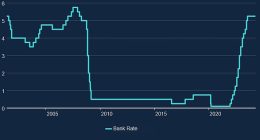
Former President Donald Trump says his brand alone is worth over $10 billion, but a pair of civil verdicts could cause financial havoc for him, legal experts said.
Trump was slapped last month with an $83 million award in the E. Jean Carroll defamation case and faces the prospect of another verdict in the coming days that could be multiples of that — while also dismantling parts of the company his wealth comes from.
That combination “would be a devastating financial blow” and could “have a significant impact” on his wealth, said Chris Mattei, an attorney who has handled similar cases.
Trump campaign spokesman Steven Cheung said Trump “built the greatest properties in the world and a tremendously successful, unparalleled business,” and he called the cases against him “witch hunts.”
“The unjust verdicts will be appealed, and all the hoaxes will be defeated, as President Trump did nothing wrong and the truth will prevail,” Cheung said.
Here’s a look at the fast-approaching financial tsunami Trump faces.
How much does Trump owe Carroll?
Trump was hit with an $83.3 million verdict on Jan. 26 for repeatedly defaming Carroll and has said he plans to appeal as soon as possible. He’s already appealing a $5 million verdict Carroll won against him last year for sexual abuse and defamation.
Will Trump have to pay while he appeals?
While the appeal could delay Carroll from collecting her money for years as it winds its way through the court process, it doesn’t stop Trump from having to come up with that cash — and then some. Under federal court rules, civil defendants have to post security for awards while they appeal, and in New York, that includes a 9% annual interest rate.
For the $5 million award, Trump had to deposit $5.5 million into a court fund — 111% of the judgment amount.
Given the size of the new award, Trump could seek to use a bond instead of posting the full amount — but that could still be very costly because surety companies can charge up to 5% of the judgment amount. For Trump, that nonrefundable fee would be about $4 million, and he’d still have to put up a large amount in cash and collateral to secure the bond.
“Nobody is going to write Donald Trump a bond for $83 million unless the full amount is collateralized,” said Ron Kuby, a veteran New York lawyer. “It would be insanity.”
How much could he owe in the New York attorney general’s civil fraud case?
When New York Attorney General Letitia James first sued Trump, his company and its top executives in 2022, she was seeking $250 million in damages for “repeated fraud” centered on Trump’s financial statements. Last month, she upped the amount to $370 million. Trump and the company have denied any wrongdoing and maintain the case is politically motivated.
Judge Arthur Engoron is expected to issue his decision on how much Trump should pay in the next week or so, but he has already found that Trump and his executives have committed repeated and persistent fraud, which doesn’t bode well for team Trump.
What happens if Trump appeals?
Trump has already said he would appeal if Engoron rules against him, but if he does, he would most likely still be on the hook for the full amount.
David Slarskey, a business litigation lawyer, said that New York state court, like federal court, requires security or a bond and that given the likely size of the award, Trump will probably move to get a bond.
If James gets the full $370 million she’s seeking, it could cost Trump up to an $18 million nonrefundable fee to the surety company. And with the 9% interest rate, the amount of money that would have to be put up would be in the $400 million range.
Mattei, who represented families of the victims of the mass shooting at Sandy Hook Elementary School in Connecticut in their successful defamation suit against far-right conspiracy theorist Alex Jones, said that if Trump and his company are hit with a judgment that exceeds his ability to pay, the company “could file bankruptcy protection.”
Another possibility would be to liquidate assets to raise cash, a move the AG’s office would monitor to make sure he’s not squirreling away assets “for his own use rather than the creditors,” Mattei said.
Adam Leitman Bailey, a New York real estate attorney who has sued Trump before, said he would most likely have to put up 10% of the judgment in cash while using property as collateral for the remaining amount. “He’s running for president of the United States. He’s not going anywhere.”
Kuby said any bond company would want full collateral for that appeal, as well. “It would be almost four times as crazy as doing it for $83 million without collateral,” he said.
If he loses the appeals, Carroll and the AG would be entitled to their full judgments, plus whatever interest accrued before the appeal was decided.
If Trump wins, he would be able to get back whatever money he put up, plus the interest, but he would lose however much he had to pay the bond company.
How much money does Trump have?
According to a 2021 statement of financial condition that was entered into evidence in the fraud case, Trump had close to $293.8 million in “cash and cash equivalents.” The AG’s office said that that number was artificially high and that it included $93 million in assets that aren’t liquid.
The statement, which was put together during the pandemic, put his net worth at $4.5 billion, a figure Trump maintains is much too low.
“We didn’t include billions of dollars in brand value,” Trump said of his financial statements in an October 2022 deposition. “If I wanted to show you a good statement, I would have added maybe $10 billion or something for the brand.”
A report last month by the monitor Engoron appointed to oversee the Trump Organization’s financial dealings said the trust that holds the company’s assets had quietly moved a chunk of cash to Trump. “I was not informed of cash transfers from the Trust and sent to Donald J. Trump, each exceeding $5 million and totaling more than $40 million, until my team conducted a review of Trust account bank statements,” the monitor, Barbara Jones, said Jan. 26 in a letter to the judge.
Kuby said that given the allegations in the AG’s case, bond companies would likely want to do their own valuations and reviews of Trump’s financial information.
Can Trump use campaign money to pay down the judgments?
Trump has been using money from the political action committees supporting his re-election campaign to pay his legal bills — over $50 million in the past year alone, according to his latest campaign filings.
One of those PACs, Save America, started 2024 with just $5 million, which wouldn’t make a dent in either award. Mattei said that if Trump wants to use more cash from his campaign or donors — or start up a legal defense fund — he would have to be transparent about what he’s doing.
“The important thing is what he is disclosing to his donors about the way the money may be used. Money contributed to PACs that are supporting him can be used for legal defense purposes, but it’s questionable whether they could be used for personal judgments,” he said.
What would the ruling mean for the Trump Organization?
The company that’s intertwined with Trump is made up of hundreds of smaller companies. The monitor said in her court filing that it comprises 415 distinct business entities.
The AG’s lawsuit sought to cancel certificates of an unspecified number of businesses that benefited from the fraud scheme that were controlled or owned by Trump. Engoron signed off on that request in a ruling ahead of the trial and applied it to other current and former top executives at the company, including Donald Trump Jr., Eric Trump, former CFO Allen Weisselberg and former senior vice president Jeff McConney. He also ordered that a monitor be appointed to oversee the dissolution of the limited liability companies (or LLCs.)
It’s unclear whether the order applies to just the LLCs or whether it would also apply to properties tied to them. The judge has said he would address the issue in a subsequent order.
Slarskey said the dissolution could “effectively be a death penalty for the corporation” and “would presumably trigger a winding-up proceeding.”
The dissolutions, coupled with a lack of available cash, could lead to defaults on properties that still have loans, and “that can take on a life of its own. It triggers a default, which triggers another default, which triggers another default,” he said.
Trump has already appealed Engoron’s order on the certificates, and an appeals court has halted the dissolutions until it hears Trump’s case.
Trump: My finances are strong
In a post to his Truth Social social media platform on Monday, Trump said he’s on firm financial footing.
“Commercial properties are under DEFAULT & LITIGATION all over the World, except for my properties where loans have been PAID OFF IN FULL, no defaults, great & powerful Financial Statements with strong protective clause, and I’m being sued by the NYSAG for borrowings from very happy lenders,” he wrote. “This case should, for the good of our Country, be dismissed.”
Source: | This article originally belongs to Nbcnews.com









